How to take smart notes - Structure Note
Boy have I learned a lot from the forum. I want to give back.
It would be fun for us more experienced "Zettel-naunts" to share our structure note of How to Take Smart Notes: One Simple Technique to Boost Writing, Learning and Thinking -- for Students, Academics and Nonfiction Book Writers by Sönke Ahrens. This is a common note to most of us and how many newcomers enter. So comparisons and contrasted will be easy to see.

Here is mine.
This is not how I'd do it today. Sort of embarrassing but it is a learning example. In my defense, my first ever note in my Zettelkasten was 11/08/18 and this note was created one week later. Over a year ago. Enough defensiveness.
Backlinks are in the "Note List". I only captured ideas that intrigued me at the time. The links at the bottom of the page are from links made months after the creation of the note. These links were intended to enhance the ideas expressed here. Some of the notes listed on this structure note have been linked to many more times from various notes in the Zettelkasten especially Separation of Concerns (which is a backlink to this note) and Mind is Unreliable. These two notes expressed ideas that have traction with me.
This is being posted to help newcomers with questions about how to start and what a structure note is. It is interesting for me to look closely at this old note and see how far I've come.
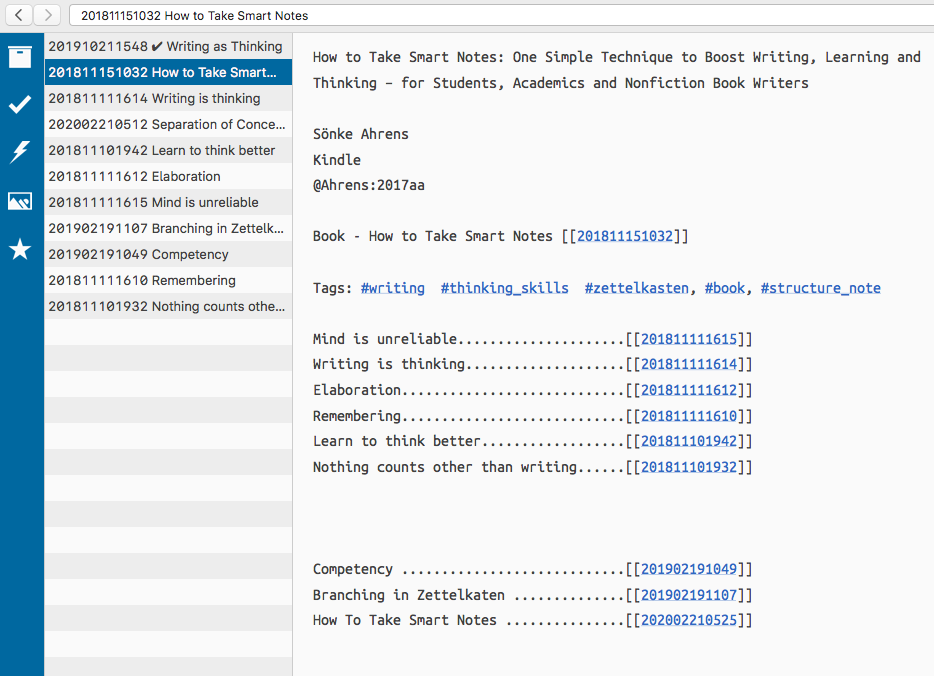
Will Simpson
My peak cognition is behind me. One day soon, I will read my last book, write my last note, eat my last meal, and kiss my sweetie for the last time.
My Internet Home — My Now Page
Howdy, Stranger!

Comments
Hi @Will, pardon if I'm continuing to bug you Can you share the files here? I want to see each note so I can finally get how to do this.
Can you share the files here? I want to see each note so I can finally get how to do this.
I tried to find actual Zettelkasten people have shared online (I found Justice for Hedgehogs notes by @ctietze, though) but I'm still confused. I think yours would help a lot—especially the Branching in Zettelkasten note
Sure.
I'm a bit hesitant to expose my thinking in a raw format but here goes, we'll see what happens.
To you, this will seem like mental diarrhea. I'm only including first-order notes and to get a complete picture would require the entire archive. These are not my best notes nor the most current. "✔︎ Writing as Thinking" (as indicated by the ✔︎) is a current project and more accurately shows how I now process a reading into a structure note.
Archive.zip
Will Simpson
My peak cognition is behind me. One day soon, I will read my last book, write my last note, eat my last meal, and kiss my sweetie for the last time.
My Internet Home — My Now Page
Thanks a lot, @Will. I downloaded your mini-archive and things got relatively clearer.
To document,
1. First, I started traversing your notes through the structure notes. The ✔︎ Writing as Thinking note showed that not every literature note turned into a permanent note. In my perspective, this note previously had a lot of notes most of which were turned into "atoms".
2. The "How to Take Smart Notes" structure note, the way I see it, displays the gist of Ahrens's book without all the extra literature notes.
3. I created a Zettel with the title: "Four slots in working memory" to simulate how to connect notes to other permanent notes. I first started with the structure notes, and here's my thought process:
Opened the new Zettel in another tab, so I can look at it while I'm traversing the archive
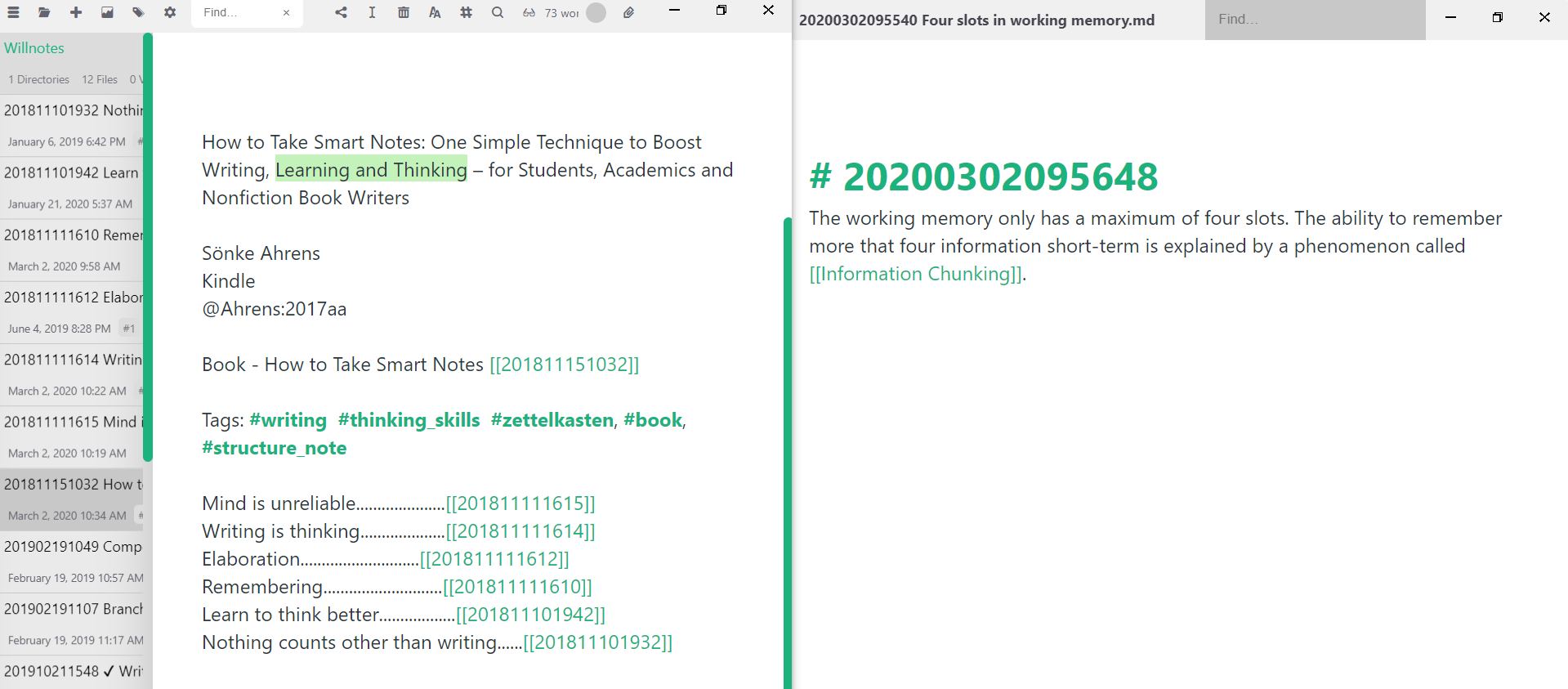
Since "How to Take Smart Notes" structure note has a theme of using an 'external brain', I click on it since it's relevant to "freeing up your working memory"
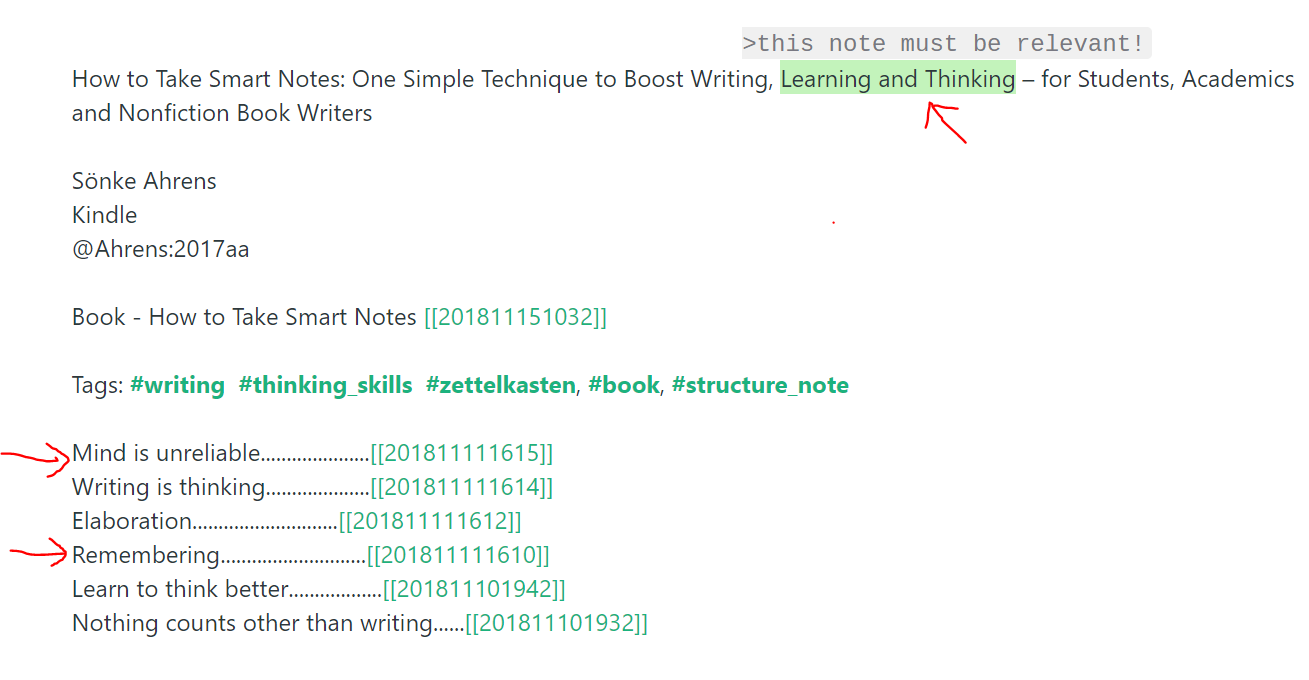
I see the links potentially relevant to my new Zettel, namely "Mind is unreliable" and "Remembering"
So I added a link to my new Zettel that says "the externalization happens because our limited working memory is freed up of resources" Okay, that's one link.
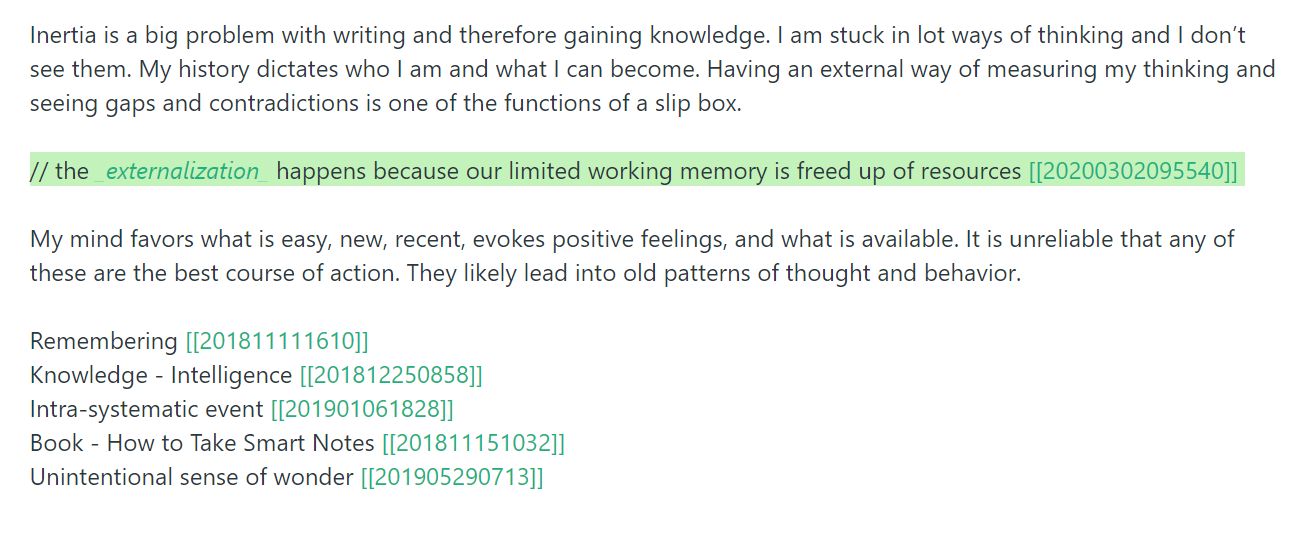
Alright, now I'm seeing that "Mind is unreliable" links to "Remembering", I click on Remembering since it's a potentially relevant note.
Is this process correct? In sum,
My takeaway: I now experienced the structure note as an "entry point"--which was hard to imagine for me until I tried. But I should still search for keywords relevant to my new zettel after that. Now then, the structure note may/may not be updated for the new Zettel. I now realize that new structure notes may be written for the purpose of developing a new insight, for example: "Forgetting allows you to focus" or something like that.
P.S. Thanks a lot, @Will, I appreciate the time you spend answering our beginner questions
EDIT: I added pictures for more info
@improveism you are on the right track. Linking and discover are juicy when they happen.
One caution though, every note doesn't have to be a structure note or be linked to one. Random ideas that strike like gifts from the universe can start off as orphaned notes, over time become intertangled with links to other notes if the notion expressed is sticky and you continue to explore it. No need to fret and force linking or think that because I note can't be linked now it is worthless. On the contrary, if I write a note about something that can't be linked-to in my Zettelkasten, by definition I'm learning something totally new.
I tend to reserve structure notes for projects, articles and book notes. You might find additional uses.
Will Simpson
My peak cognition is behind me. One day soon, I will read my last book, write my last note, eat my last meal, and kiss my sweetie for the last time.
My Internet Home — My Now Page
That hits home for me! I'll try to experiment more re: gifts from the universe and tell others my experience. (I had them stored in an inbox)
and tell others my experience. (I had them stored in an inbox)
Thanks for all the advice, @Will. Much appreciated!
And here is mine: two structure notes actually, one for the Ahrens book (more of an index note), and my overall zettelkasten structure note:
Started ZK 4.2018. "The path is at your feet, see? Now carry on."
@Phil Thanks for sharing.
Great idea to make a zettelkasten structure note. I have tons of notes but they are scattered all throughout my archive.
Will Simpson
My peak cognition is behind me. One day soon, I will read my last book, write my last note, eat my last meal, and kiss my sweetie for the last time.
My Internet Home — My Now Page
Perhaps to show contrast, here is a picture of a structure note from the introduction chapter of Accidental Genius by Mark Levy (I haven't read Smart Notes). The software I use is hyperlink friendly and I find it difficult to simply list the Zettel notes I've taken only showing their titles. My structure notes contain my running thoughts I have of the chapter, summarizing, and separating notes and links by the headings the author has used. I insert hyperlinks to other structure notes (Dreams and Memories) in this case. Zettel notes are probably easier to identify by the structure of the title i.e. Mind - Storehouse and Freewriting - Definition. As probably noted I don't show the unique Id for each note, one exists, but I find it annoying to be part of the text.
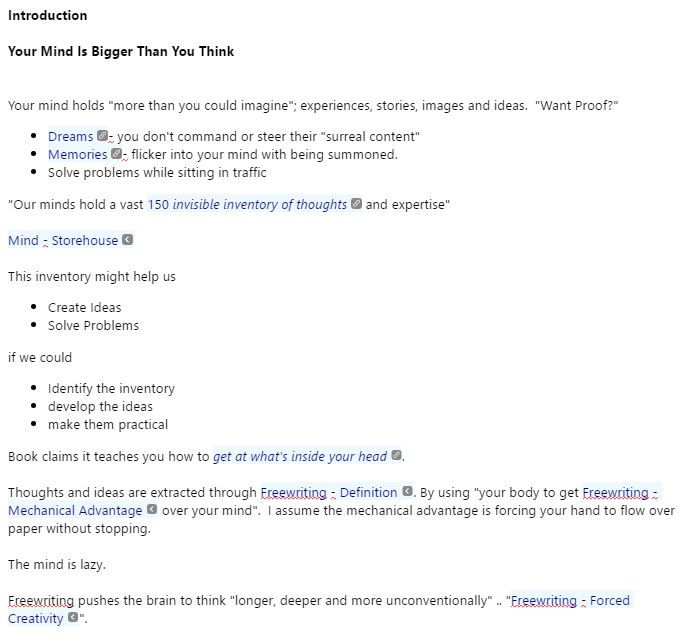
@Steve625 Thanks for sharing. What software do you use? It outputs a nice presentation of your Zettel.
I like how your structure note puts the individual notes in context. You show that some notions like
are too small for a separate note and yet worth capturing in the structure format because it adds context to the other notes. I like how you make conclusions, as in:
I like how you are asking questions, as in:
Your example is much like how I format my structure notes today. Though I usually have a reference section. The lead note in this thread was made Nov 15, 2018. A thousand notes ago. Workflow has evolved. Mostly for the better, I hope.
Will Simpson
My peak cognition is behind me. One day soon, I will read my last book, write my last note, eat my last meal, and kiss my sweetie for the last time.
My Internet Home — My Now Page
@Will I missed the lead note thread date, that is a long time ago. Things definitely evolve as our learning is enhanced by conversation, one of my favorite things about the forum. I've use thebrain.com software for approximately 15 years to capture thoughts, notes, journal entries, pictures, memes and pretty much anything that strikes me as interesting. It is a form of mind mapping software. The software is extremely robust for linking one note (referred to as thoughts by the brain) to another. The text editor is somewhat weak but does what I need it to do. As mentioned the links are the primary power driver I use to connect ideas together.
I have 3 "brains" that I use. One might be apply named my "Collectors Fallacy hall of fame", and it contains about 30 thousand thoughts. Most actually contain some form of personal note about why the thought was important to me at the time of capture. Some contain multiple time-stamped thoughts as my insights changed and I matured over time. Too many thoughts and notes, all linked, to scratch and start over.
I have a second "brain" that contains articles, blogs, and trip reports that I've written or are currently working on. It's handy to have a second area open to type while jumping from one thought to another in the first. I struggled to get a Zettelkasten integrated into either of these two brains. I was surprised to finally figure out that all the external scaffolding I had set up in my first brain, to link thoughts to each other, was a large hindrance to the free flow nature of a Zettelkasten. Since removing all external links for keywords, jump thoughts, children and parent thoughts and just allow the individual Zettel notes to free float so that I have to search for connections via the search feature, this has really helped set up a third brain which I now consider a true Zettelkasken. The Zettel note contains all the keywords, links, connections, references, etc. that you would expect to find in a Zettel.
P.S. I've followed the forum for some time and I have enjoyed your thoughts and insights. You are truly a master Zettelnant.
@Steve625 I'm always interested in how people use different software for knowledge management. I'm jealous, I only have two external brains. Evernote with 12 thousand notes and my Zettelcasten with 1073 notes,.
Our mention of "trip reports" perks my attention. What type of trip reports are you talking about? Are you a backpacker?
Will Simpson
My peak cognition is behind me. One day soon, I will read my last book, write my last note, eat my last meal, and kiss my sweetie for the last time.
My Internet Home — My Now Page
@Will Peakbagger / hiker would be more like it. I do the occasional backpacking trip, but I prefer to summit mountain peaks and sleep in my own bed. If you don't mind the occasional productivity blog tossed in you can browse a few of my reports at https://lindasbrickbarn.com/steves-trip-reports or a popular site worldwide that I happened to be lucky enough to draw a permit is https://lindasbrickbarn.com/steves-trip-reports/2018/8/26/the-wave-coyote-buttes-quad
My main Structure Zettel for "Zettelkasten":
Quite a number of the linked Zettel are Structure Zettel itself:
Or:
No Zettel dedicated to Ahren's book, though.
I am a Zettler
@Sascha what is "Kill you your Inbox"?
An argument on why you shouldn't use inboxes or at least minimise their part in your workflow.
I am a Zettler
@Sascha I thought that might be it. subject for a different thread, but do you elaborate on that anywhere? I love the inbox as a place for a gtdstyle brain dump (although I hate that term...), but I also recognize that an inbox needs to be processed into separate Zettel before it gets too full. Would love to know your thinking
@argonsnorts I am not aware that I presented that line of argument anywhere in public. But is not complicated:
Basically, inboxes add to much complexity and steps into an already complex process. Simple example: Instead of dumping ToDos into the inbox, I directly put them where they belong (GTD-esque). I invest just a couple of seconds more in the moment but safe a whole appointment (e.g. weekly inbox empty).
It is a sort of calculation in a manner like calculating friction cost for complex manufactoring lines. That is combined with the neurological foundation of knowledge processing and habit drift (from my work as a coach). The foundation is quite a calculation. Habit drift for example is a model for my work. It shows how habits evolve or devolve. The implication is to set up habit patterns to have a beneficial internal dynamic. (e.g. dieting sets up good habits in an overall bad habit pattern. This is one of the reasons why many people try and do not achieve and some people try a little and things start to blow off)
I am a Zettler
@Sascha Habit drift is a great concept, I'd not heard it before. For now, it's my habit to use an 'inbox' as a place for collecting notes without worrying about whether they are fully formed. It's a place to let them sit for a bit in an infant state, let's say. I find that I need to return to an idea a few times, to rephrase it or even totally reassess it, before adding it into the zk as a permanent note somewhere. I don't have a set recurring appointment for "clearing" the inbox, as I would find that daunting, and I try to avoid things that are daunting. It's just when I sit down to work, I tend to start in my inbox, reading through the fledging notes there, and seeing what I can do about making them in to full-fledged Zettel. Sometime's I find they're worthless and just delete them, or that they're ideas I've had before only phrased differently. Sometimes I even find something valuable. Perhaps it's less of an "inbox" and more of a workspace, if that's a meaningful distinction. Anyway, it has been a beneficial process for my work lately, but I will keep an eye on it, in case it starts to drift off into the bad habit zone. Thanks for that concept.
So now, to keep the thread on topic, here's the literature note (or structure note, if you like) for Ahrens' book that I started but evidently abandoned.
You couldn't because it is a model I developed for myself and my work. It is unpublished. Unless somebody develops somewhere independent of me.
I am a Zettler
I'm new to zettelkasten and curious to read this. So far, I haven't added many new zettels but I did happen to create what I'd called a literature note on How to Take Smart Notes but I've done it differently—while I had understood the rule of one thought per note, I had put all of my notes (not the rough, fleeting notes, but the distillation of those thoughts) into one zettel under headings. I suppose those are easily broken down into separate notes. I can see the benefit, with this example.
My notetaking on this book in particular had raised another question, which is when I am consuming information because I am trying to learn a method or tactic. In this case, I had a note that captured the method for writing a paper as described by Ahren--but it was far less of a "conversation" with the book than me recording a method I wanted to adopt. (Another example from the same book is Ahren's description of the three different kinds of notes.) It's something I am thinking about as I had intended to have just one zettelkasten but I do read a number of things that are for work and describe methods or different approaches. (But, maybe this is an example of the collector's fallacy for me--I collect these with the idea that I will apply them, some day, but they just collect dust.)
@djdrysdale As time goes on you'll pick up various strategies for digesting reading material. I use different strategies for long books, class notes, short readings, and random bolts of inspiration. Sometimes creating one big Zettel to start is the strategy used. Consider, as you have, then splitting it into atomized bits. This is a second opportunity to review the material. Consider the first Zettel your notes from which you further process, explode, in your Zettelkasten. This is a fine strategy in some cases.
When reading and processing for my Zettelkasten, sometimes I find I am easily having a "conversation", sometimes not so much. My varying interest levels and depth of domain knowledge have a lot to do with this. I strive to question and argue with the authors' thesis when reading, but I'm not always at my best game. I assure you that you will get better with practice. This applies to work relate reading also.
I want to encourage you to "have just one zettelkasten". This can be powerful.
Will Simpson
My peak cognition is behind me. One day soon, I will read my last book, write my last note, eat my last meal, and kiss my sweetie for the last time.
My Internet Home — My Now Page